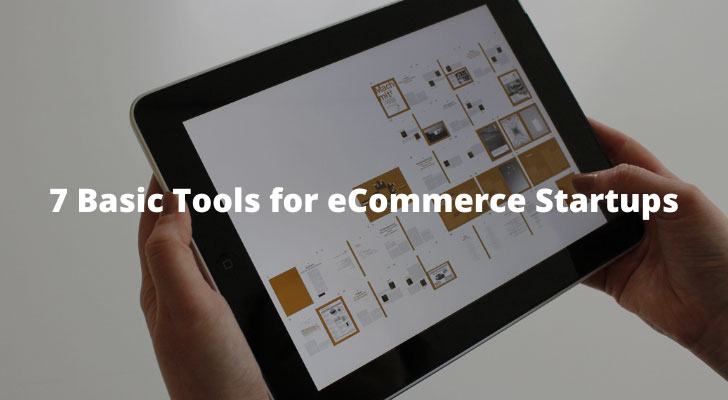If you are a new entrepreneur looking to venture into the eCommerce space, you may be on the right path. Back in 2017, Nasdaq estimated that that by the year 2040, up to 95% of all purchases will be through eCommerce. Now we know that anything could happen in the future. eCommerce is already old and competitive but there is still an opportunity for growth in the space. Just like any other business, the key to success as a startup is to get it right from the onset.
For starters, you ought to know the right internet tools that may make work easier, saving you more time and cash while growing profits. Here we will explore 7 of the most basic eCommerce tools that might help turn your eCommerce startup into a success.

Some Basic Tools for a Startup
Here are some of the tools that allows business owners to manage their online stores effectively. These programs automate, streamline, and organize respective processes to facilitate selling and buying on your online stores. They include apps, platforms, or plugins that facilitate your online store business. The following are our top pick tools for a startup:
1. Payment Processing System
A payment processing system makes it easier to accept customer payments and transfers them to your account. The payment processing system links your eCommerce store to a payment processor. You can leverage a third-party processor where the customer enters the right information in a secure payment gateway then the information is encrypted and sent for checkout.
The processor communicates with the respective bank to check whether the required funds are enough for payment. If this is true, the respective amount is debited from the customer's account and transferred to your merchant account.
Choosing a reputable processing system is important for the success and growth of your eCommerce. Some of the most important factors to consider are the level of security, ease of integration, types of payment methods supported, types of subscriptions, and whether you are dealing with an international or domestic customer base.
Some of the most popular eCommerce payment processing companies include;
Concerns about payment security is one of the biggest reasons for cart abandonment in eCommerce shops. Customers also tend to dislike creating an account before they can checkout and pay on eCommerce shops. Business2Community says that 37% of all shoppers say that it is a reason why they've abandoned carts. If you use one of these reputable services, you don't have to worry about security as you implement a payment processing system for your customers.
2. eCommerce-Ready Website
An eCommerce platform is a core infrastructure that allows you to buy and sell over the internet. After all, you don’t have to build everything from scratch. You need a tool that makes your online store functional faster, giving your customers that online shopping experience they are looking for.
The good thing is that there are excellent eCommerce solutions in the market tailored for different types and sizes of businesses, including startups. These platforms are classified as either subscription-based, headless, or open-source eCommerce platforms. Keep in mind though, that each eCommerce platform has its pros and cons.

WooCommerce plugin
So, take time to choose the right eCommerce platform for your startup. You ought to factor in eCommerce needs, price, security features, payment options supported, technical support, Search Optimization Engine (SEO), responsive web design, integrations, and scalability, among others. Some of the highly-rated eCommerce platforms include;
- WooCommerce plugin for WordPress
- Shopify
- BigCommerce
- Magento Commerce
- Wix
- Squarespace
- Volusion
- 3DCart
Pick a top eCommerce that will allow you access to many free/paid plugins to create a seamless experience for you, your team, and the customers.
What Do You Advocate?
3. Accounting Software
Maintaining the integrity and sparking business growth is tougher without the right accounting software. Accounting software helps to keep a record of all your financial transactions in a manner that is easy to understand and use. They ensure proper cash flow management, a seamless overview of business finance, useful analytics, ease of data sharing, and setting competitive pricing. Simply put, they provide accounting and bookkeeping needs for your online business.
Again, there are many accounting tools that can help meet your business needs ranging from payroll, taxes, forecasting, and reporting. The key features of good accounting software include simplicity, price, ease of integration, technical support, reporting, and ease of maintenance. Some of the top-pick accounting software include;
- QuickBooks
- Wave Accounting
- Lightspeed
- Entriwise
- Prepare
- A2X
- Dext
- PlanGuru
4. CRM (Customer Relationship Management) Software

HubSpot
CRM is a tool that lays focus on cultivating lasting business relationships with customers. Remember, each customer is an indispensable component of your business. Without engaging with them regularly, your sale may be a one-off and hence no sustainability to your business. Research also shows that it is more expensive to acquire a customer than to keep one.
This is why every startup should invest in creating and maintaining good customer relationships. With the evolving customer needs and stiff competition, you can't afford to play cards with your customer satisfaction. Doing it manually is nearly impossible, especially when dealing with huge customer traffic.
Fortunately, CRM tools come to the rescue by automating customer relationship actions and making it easy to attend to customer needs with speed and efficacy. As a bridge between customers and business, you need to consider several essential functional features when choosing the right CRM tool for your eCommerce.
Look at features like lead generation, integration, comprehensive analytics, and customer support options. The top CRM tools in the market include the likes of;
- Salesforce
- Hubspot
- Zoho
- Marketo
- Infusionsoft
- Base CRM
5. Project Management & Collaboration Tools
Traditionally, physical meetings were the basis of business operation and management. However, the paradigm has largely shifted into the virtual space. This is why you need good project management and collaboration tools for your eCommerce business. Project management tools provide a platform for collaboration and communication with relevant personnel, scheduling meetings and events, file sharing, enhanced decision making, integrations, and task delegation.
Finding the right project management and collaboration tools will streamline your projects and set the stage for your business's success and growth. Just like other crucial eCommerce tools, you ought to consider some important metrics before picking project management & collaboration tools for your startup.
Some of the factors worth considering include scalability, collaboration features, ease of use, security, integration, consolidation, user interface, and customizability. Some of the project management & collaboration tools that tick these boxes include;
6. Lead Generation and Email Marketing Services
Lead generation and email marketing are two vital components of any business success. Marketing links businesses to customers. With the competitive market and changing customer needs, failure to sharpen your marketing techniques is a recipe for failure. The beauty is that there are many tools and platforms that simplify most marketing tasks..
In eCommerce, automated marketing has changed the marketing landscape, and you can reach potential customers/clients with minimal effort. It does save time and money. It will also improve productivity and efficiency, enhance the ability to generate better leads, and align your sales and marketing goals.
When choosing the right marketing tools for your eCommerce, consider factors like pricing, the ease of integration with existing software, and usability. Some of the highly-rated email marketing tools for eCommerce include;
- MailChimp
- Constant Contact
- AWeber
- Active Campaign
- GetResponse
In this case, just pick the right tool according to your budget. For effective lead generation, we recommend Thrive Architect.
7. Social Media Scheduler
In the modern world, social media is a haven for all kinds of people and is a place where you can easily find your target customers. Social media is almost the first resort for every business to grab potential customers. While many popular social media sites drive millions of traffic, managing them requires time, energy, and resources. Posting content and responses isn’t that easy when handling multiple social media accounts. It is even worse for startups or small businesses with a few personnel to manage these scattered social media accounts.

Hootsuite
Well, social media management solutions are making it easier to manage social media for eCommerce shops. These tools allow companies to keep up with social media engagement, schedule posts before time, increase social accountability, spare time for real-time engagements, monitor brand mentions, and analyze social performances.
A good social media management solution for your eCommerce startup should be cost-effective. Furthermore, it should support multiple social media sites. It should also allow content scheduling. The tool should generate social media analytics and performance reports. It should also be easy to use.
Better even, it should provide social media listening capabilities to help mine some insights on what your customers are saying about you. Some top-rated social media management solutions include;
- Buffer
- Hootsuite
- AgoraPulse
- Sendible
- eClincher
- Sproutsocial
- Zoho
- SocialPilot
- MeetEdgar, etc.
Wrapping up
There are different facets of marketing. For example, if you are looking to improve your eCommerce SEO rankings, you can use tools like SEO Site Checkup to audit for issues. You can use SEMRush tool sets to access SEO, paid traffic, social media, and content/PR analysis tools, and so on.
Running your eCommerce business as a young entrepreneur is easier with the right tools. Remember, there are many options in the market, ranging from open-source options and paid options you can pick from in the market. Just select the right eCommerce tools and utilize them to streamline and grow your eCommerce business faster.
For $299/year or $149/quarter
Thrive Suite Includes:

